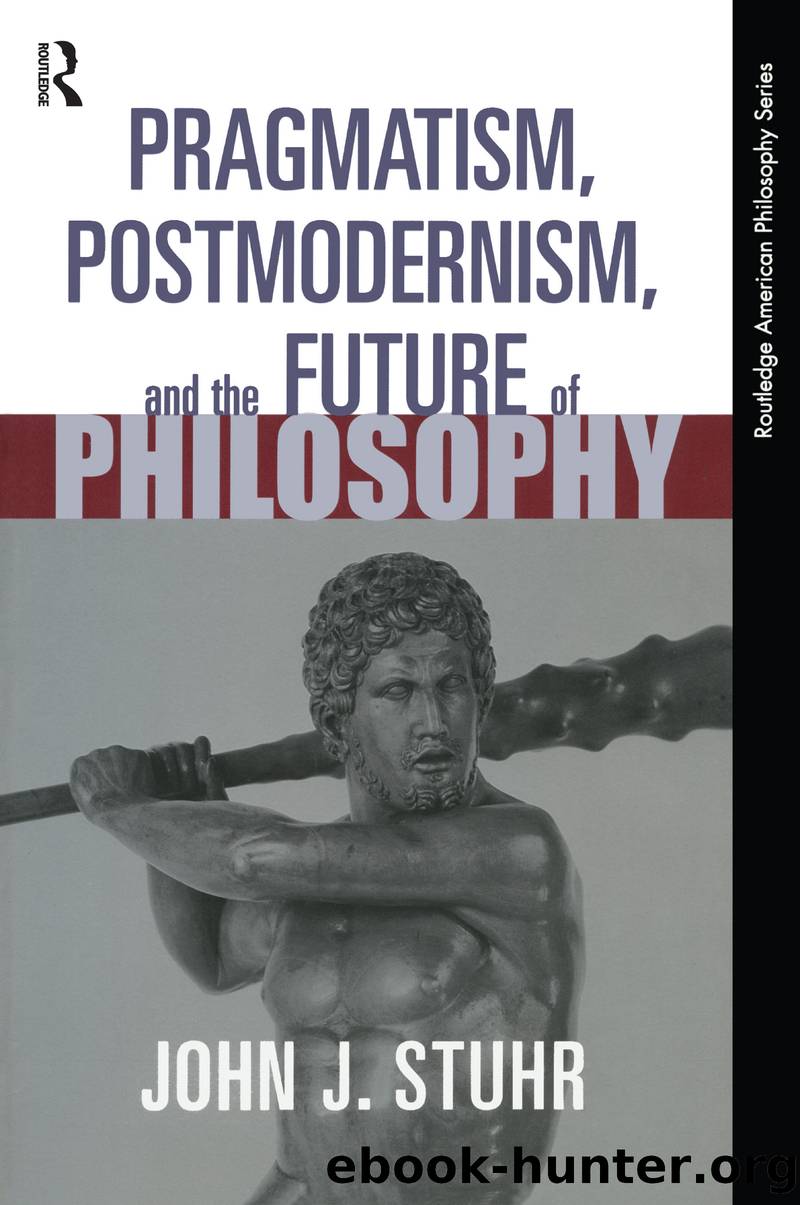Pragmatism, Postmodernism and the Future of Philosophy by Stuhr John J.;

Author:Stuhr, John J.;
Language: eng
Format: epub
Publisher: Taylor & Francis Group
Published: 2003-08-15T00:00:00+00:00
On the Superiority of American Philosophy
It is the same in philosophy as in a film or a song: no correct ideas, just ideas.... You should not try to find out whether an idea is just or correct. You should look for a completely different idea, elsewhere, in another area, so that something passes between the two which is neither in one nor the other. 20
Despite the Deleuzian demand for novelty, pan-machinism is not a brand-new story. It is a repetition, if, of course, a difference. Pan-machinism is pragmatism, a minor philosophy (is this phrase redundant yet?). Deleuze is a pragmatist, he repeats/differs pragmatism. Recognizing the superiority of American literature, remarking on the fact that American philosophy is so poorly understood in France 21 (and by American "French" philosophers), recognizing that American philosophy had no need to detour through Nietzsche, Deleuze embodies American pragmatic philosophy. He is a pragmatist. Here is a largely unscratched site, a dissertation-free surface, territories for vast future research programs that develop this linkage:
Deleuze as Emerson; Philosophy as creation, self-reliance, and an original relation with the universe; the repudiation of travel and the view of the nomad as one who settles into place, refusing to disappear; 22 the intimate connections between philosophy and nationality, philosophy and place, surface and striationsâa geophilosophy that delivers history from necessity to contingency and transcendence to differences and ordinariness.
Deleuze as James: Pan-machinism as empiricism, as radical empiricism; empiricism as pluralism, as neutral monismâ"I have always felt that I am an empiricist, that is a pluralist"; 23 anti-Hegelianism, and the recognition of idealism and dialectics as illness; the focus on consequences, last things, productions, and concrete multiplicities; relevance, not truth.
Deleuze as Dewey: Philosophy as criticism, as the attempt to dissolve and get behind old problems rather than provide better or final answers; philosophy as reconstruction and reterritorialization, and evaluations as ways of being; the focus on the art of constructing or determining a problem, and philosophy as the elaboration of a question and its implications; 24 the contrast between philosophy and the history of philosophy; the subject as a product, a self that does not have a history but is a history; the rejection of dualisms; the awareness of links between reconstruction in philosophy and reconstruction in society, pan-machinic pragmatism as instrumentalism.
Download
This site does not store any files on its server. We only index and link to content provided by other sites. Please contact the content providers to delete copyright contents if any and email us, we'll remove relevant links or contents immediately.
| Deconstruction | Existentialism |
| Humanism | Phenomenology |
| Pragmatism | Rationalism |
| Structuralism | Transcendentalism |
| Utilitarianism |
The remains of the day by Kazuo Ishiguro(7577)
Tools of Titans by Timothy Ferriss(6970)
The Black Swan by Nassim Nicholas Taleb(6205)
Inner Engineering: A Yogi's Guide to Joy by Sadhguru(5917)
Giovanni's Room by James Baldwin(5898)
The Way of Zen by Alan W. Watts(5813)
The Six Wives Of Henry VIII (WOMEN IN HISTORY) by Fraser Antonia(4801)
The Power of Now: A Guide to Spiritual Enlightenment by Eckhart Tolle(4775)
Astrophysics for People in a Hurry by Neil DeGrasse Tyson(4631)
Asking the Right Questions: A Guide to Critical Thinking by M. Neil Browne & Stuart M. Keeley(4603)
12 Rules for Life by Jordan B. Peterson(3753)
The Ethical Slut by Janet W. Hardy(3513)
Skin in the Game by Nassim Nicholas Taleb(3484)
Housekeeping by Marilynne Robinson(3423)
The Art of Happiness by The Dalai Lama(3392)
Double Down (Diary of a Wimpy Kid Book 11) by Jeff Kinney(3287)
Skin in the Game: Hidden Asymmetries in Daily Life by Nassim Nicholas Taleb(3275)
Walking by Henry David Thoreau(3239)
12 Rules for Life: An Antidote to Chaos by Jordan B. Peterson(3211)
